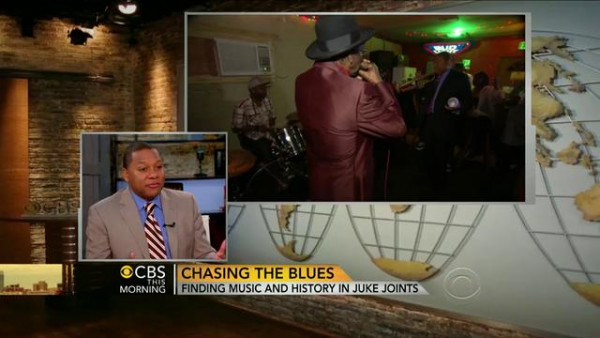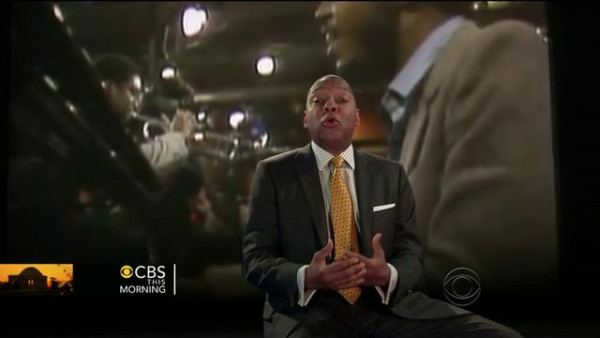On Martin Luther King’s Legacy
On Monday January 16, 2012 Wynton appeared on “CBS This Morning” to premiere his remembrance piece on Martin Luther King Jr. Check out the video below:
Unedited Version of the Essay
I grew up in segregated towns in Louisiana: Breaux Bridge, Little Farms, Kenner….the old south. My parents sat behind screens on buses well into adulthood. Our world was entirely black.
I was in the second grade when Martin Luther king Jr. was assassinated. We were sent home early that day. I had absolutely no sense of who he was at the time.
The next year my brothers and I went to the white school across the tracks. My momma said change wouldn’t come from complaining. King had sacrificed, so should we. And for us, integration came at a steep price. Just your nicknames alone, like Mr. Magoo or Blackie or Burnt Toast, or the fact that you would get a toy monkey every time kids exchanged gifts at Christmas. It was tough…but we had more in common with the white kids than segregation would have us believe. Simple things like…you all hated Friday fish squares but loved sloppy joes. Still, all the sloppy joes in the world weren’t going to extinguish the flames of injustice that singed anything brown.
As I grew into teenage-hood the integration experience left a bitter taste in my mouth. The street level feeling about Martin Luther King was that he was a dreamer and not enough of a revolutionary. That he was accomodationist and old school. To the youth, his image was not as alluring as the dashiki clad big- Afro black revolutionary. The suit, skinny tie and Negro preacher language was passé. We were BLACK anyway. And, his nuanced conception of a unified America (in which all was forgiven) was not as dramatic, appealing, or strident as the Black Power narrative. The proverbial ‘line drawn in the sand’ always enflames the passions of the disaffected. It was next to impossible to love and forgive. You wanted to hate and scream for revenge.
‘This was 350 years of oppression come crashing down on you,’ and King is asking you to whisper instead of holler. Man, you must be crazy! That’s why the poster over my bed in high school wasn’t King, it was Malcolm X. Anyway, Malcolm’s autobiography was better known than anything King ever wrote. My understanding of King would change dramatically one night in New York City.
When I was 17 and recently moved, I was arguing with a young white college student in a jazz club, Mikell’s, on 97th and Columbus. Provoked by his accurate observation that black people didn’t patronize jazz clubs, we began arguing about contemporary race relations. He went on and on about the greatness of King. I said, “Man, King was an Uncle Tom.” He looked at me as if I had lost my mind and asked if I had ever read Letter from Birmingham City Jail, had I read Why We Cant Wait, or Where Do We Go from Here: Chaos or Community? I tried to pretend I had. He then said, “Of course you haven’t because, YOU’RE BLACK AND YOU ALL NEVER KNOW ANYTHING ABOUT YOUR HISTORY OR CULTURE.”
At that moment, I was ashamed. Shamed to admit to myself that the truths of this great man, who had just recently improved the quality of my life as an American, WERE largely unknown to me.
I began reading Dr. King’s books and about him, and discovered a powerful revolutionary who transformed our way of living. He actualized the American dream in the truest sense of the word, entering Morehouse College at 15 to receive a classical education. He went on to sculpt a unique poetry. One that created a direct association between the Bible and the Constitution, and the way we treat one another. He created a bridge between the struggle of the Negro and the Judeo-Christian tradition (that most of America leadership ascribed to at that time). He flipped the script on our common religious themes, which were read to say that black people were on the bottom where they should be, and taught our country how to reassess a common spiritual heritage.
Honest religious intellectuals, like Abraham Joshua Heschel and Reinhold Niebuhr recognized the artistry and mastery of his insight, and welcomed his innovative methods of counter-stating a ‘segregated church’ narrative that was clearly indefensible.
With an irresistible lyricism, Dr. King galvanized an All-American army from all walks of life… believers, thirsty for change…citizens willing to sacrifice for the most essential national concern: freedom. Their achievements together, in the cause of justice, exposed racism as immoral. We now live a national reality shaped by their actions and deeds.
In spite of that fact, today, too many of us remember Dr. King as an idealistic dreamer who led a social movement exclusively for black folks. This does him and us a great disservice.
Fact is, Dr. Martin Luther King Jr. IS action. Under his generalship, civilian forces of labor, clergy, youth, and even politicians marched to a string of great victories: the Civil Rights Act of 1964 and the Voting Rights Act of 1965 amongst others. These laws made racism illegal, and made us all better Americans.
Those are FACTS even though we may FEEL that King led a movement exclusively for black people. We may FEEL that he was a passive dreamer, but who amongst us goes to the doctor to ask how she FEELS about our health? We accept that you can feel fine and be one step from death’s door. And just as knowledge of family medical history affects a doctor’s diagnosis, knowledge of national cultural history is of central importance to an accurate social prognosis.
We owe it to ourselves to embrace the FACTS about Dr. King’s work and seek the appropriate prescription for what ails us. We owe it to ourselves to embrace his beliefs, philosophies, and actions. We owe it to ourselves to read his works.
His writing and soaring rhetoric was poetry itself, glittered with cultural references. Just a cursory glance and we see references to Washington Irving, William Faulkner, T.S. Eliot, James Weldon Johnson, Langston Hughes, John Donne, Victor Hugo, Thoreau….on and on. He used artists and poets throughout history to provide a context for our struggles and a blueprint for reaching higher ground.
The legacy of Dr. King is all around us. It’s all up in us. The churches we attend, he attended. The songs we sing, he sang. The highways we drive, he drove. Even back then, he preached timeless human fundamentals that we all share. He once said, “Everybody has the blues. Everybody longs for meaning. Everybody needs to love and be loved.”
Dr. Martin Luther King Jr. paid the ultimate price to bring our nation together in the fight for freedom. The power of a unified national community is something that we have forgotten.
It’s up to us to revive and sustain it. Today and Always.
Wynton
Dr. Martin Luther King, Jr., Opening Address to the 1964 Berlin Jazz Festival.
WPFW News (Washington), [23 August 2002]
God has wrought many things out of oppression. He has endowed his creatures with the capacity to create—and from this capacity has flowed the sweet songs of sorrow and joy that have allowed man to cope with his environment and many different situations.
Jazz speaks for life. The Blues tell the story of life’s difficulties, and if you think for a moment, you will realize that they take the hardest realities of life and put them into music, only to come out with some new hope or sense of triumph.
This is triumphant music.
Modern jazz has continued in this tradition, singing the songs of a more complicated urban existence. When life itself offers no order and meaning, the musician creates an order and meaning from the sounds of the earth which flow through his instrument.
It is no wonder that so much of the search for identity among American Negroes was championed by Jazz musicians. Long before the modern essayists and scholars wrote of racial identity as a problem for a multiracial world, musicians were returning to their roots to affirm that which was stirring within their souls.
Much of the power of our Freedom Movement in the United States has come from this music. It has strengthened us with its sweet rhythms when courage began to fail. It has calmed us with its rich harmonies when spirits were down.
And now, Jazz is exported to the world. For in the particular struggle of the Negro in America there is something akin to the universal struggle of modern man. Everybody has the Blues. Everybody longs for meaning. Everybody needs to love and be loved. Everybody needs to clap hands and be happy. Everybody longs for faith.
In music, especially this broad category called Jazz, there is a stepping stone towards all of these.



Comments
My next door neighbor was in his 80’s and passed away this year, but he literally walked with King as a white clergyman through many of his darkest moments. His stories are echoed clearly in my memory as Wynton shared his piece. May we all come to understand with the same clarity of mind who we are as a nation. Thank you again Wynton.
Mnktbierer on Jan 24th, 2012 at 6:39pm
angie
powerful
Angie Marquez on Jan 18th, 2012 at 10:50am
Beautiful tribute to Dr. King’s legacy.
m on Jan 17th, 2012 at 7:10pm
What a wonderful tribute to Dr. King. His message is as important today as it has ever been.
Hudsonomegaaka on Jan 17th, 2012 at 10:43am
Great tribute!
Harlembrew on Jan 16th, 2012 at 4:55pm
I loved this piece. I have often shared Dr. Martin Luther King’s Message of peace. I am so pleased to see today it is still being shared and with such honest viewpoint. I hope it continues to bring people together.
Maggie on Jan 16th, 2012 at 4:27pm
Amen!
Barbarapowrie on Jan 16th, 2012 at 3:10pm
Thank you for this meditation on Dr. Martin Luther King, Jr. His message has affected me since late childhood – a blessing for all of us in the USA and the world.
M Ferrick50 on Jan 16th, 2012 at 11:47am
I really appreciated the show, it allowed me to have a comversation with my grandson about M L K
Many, any Many Thanks.
Mdelancy41 on Jan 16th, 2012 at 11:37am
Thank you, Wynton Marsalis. What a profound tribute to Dr. King. I plan to have my students watch this in order to get a sense of who he really was.
SFTeacher on Jan 16th, 2012 at 11:27am
GREAT!!!!!!
I´ve no words.
God bless you.
Take care.
Careba
Soniacareba on Jan 16th, 2012 at 11:14am